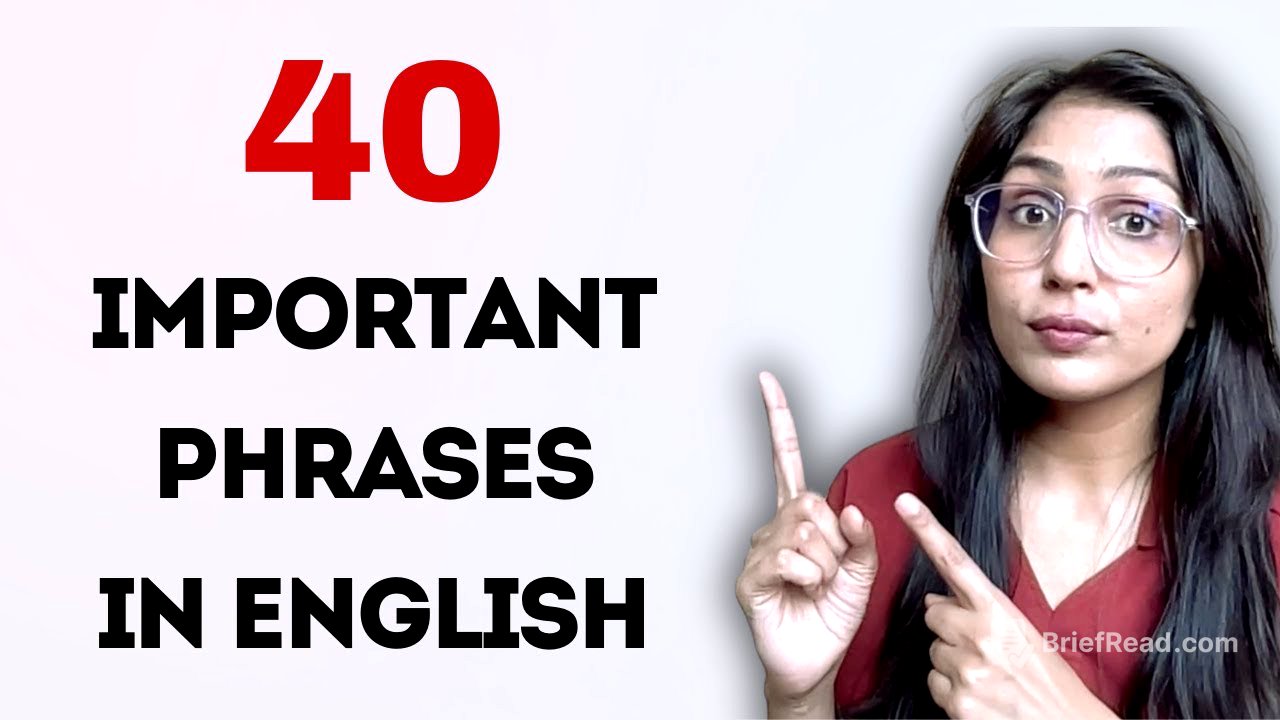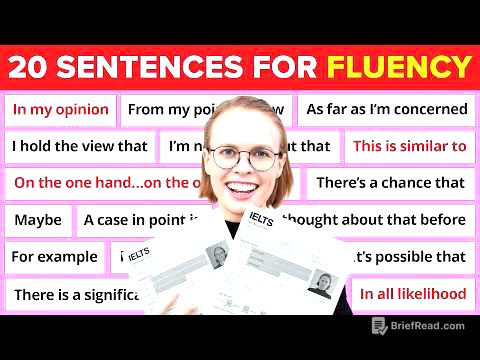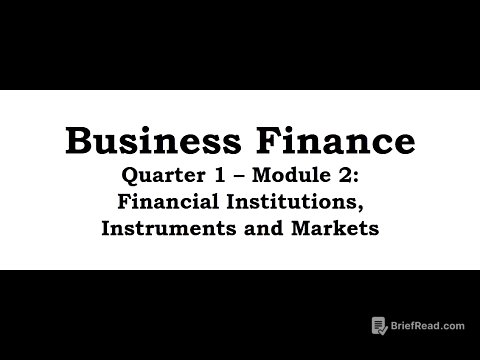TLDR;
This video provides 40 useful English phrases for everyday conversations to help learners communicate confidently. The phrases are grouped by the feelings or situations they describe, such as happiness, being overwhelmed, making mistakes, expressing interest, or facing unexpected events. Each phrase is explained with examples to ensure clear understanding and practical application.
- Expressing Feelings: Phrases for happiness, excitement, stress, and being overwhelmed.
- Managing Tasks: Phrases for handling responsibilities, being busy, and juggling multiple commitments.
- Addressing Mistakes: Phrases for admitting errors, failing, and facing difficult situations.
- Showing Engagement: Phrases for expressing interest, listening attentively, and agreeing with someone.
- Handling Surprises: Phrases for unexpected events, feeling unprepared, and stepping out of one's comfort zone.
I am on Cloud N and I am over the moon [0:31]
The phrases "I am on Cloud Nine" and "I am over the moon" are used to express extreme happiness or delight. For example, "I am on Cloud Nine because I got my dream job" or "I'm over the moon because I finally cleared my driving test."
I am so pumped [1:08]
The phrase "I am so pumped" is used to express super excitement about something. For example, "I'm so pumped up for today's party because I have been waiting for it for many months."
I'm Overjoyed [1:32]
The phrase "I'm Overjoyed" is used when you are very, very happy. For example, "I'm Overjoyed to move into a new city" if you love the new city you moved to.
I have got a lot on my plate or I have got my hands full [1:49]
The phrases "I have got a lot on my plate" or "I have got my hands full" are used when you have many responsibilities or tasks to handle. For example, "I can't take on any more work because there is already a lot on my plate" or "I have got my hands full right now with my new project, so I can't help you."
I am juggling a lot [2:28]
The phrase "I am juggling a lot" is used when you are managing many things at a time. For example, "I wish I could join, but I'm juggling a lot with my family and my work commitments."
I'm all tied up [2:52]
The phrase "I'm all tied up" is used when you are too busy to take on any other task. For example, "I wish I could help, but right now I'm all tied up with meetings until this afternoon."
I in the middle of something [3:15]
The phrase "I in the middle of something" is used when you are currently busy with some task. For example, "Can we talk later? I'm in the middle of something right now."
I freaked out [3:38]
The phrase "I freaked out" means when you become very anxious, scared, or surprised suddenly. For example, "I freaked out when I realized I lost my keys or my phone."
I'm losing my mind or I lost my cool [4:03]
The phrases "I'm losing my mind" or "I lost my cool" are used when you are feeling very upset, stressed, or overwhelmed and you can't think straight about something. For example, "With all this work, I feel I'm losing my mind" or "I lost my cool when I missed my flight."
I have lost my nerve [4:35]
The phrase "I have lost my nerve" is used when you get panic or you are too afraid to do something. For example, "I wanted to go on stage, but I lost my nerve at the last moment."
I messed up [4:58]
The phrase "I messed up" is used when you feel you have made a mistake or you have done something wrong. For example, "I messed up; I accidentally deleted all my important files."
I blew it [5:15]
The phrase "I blew it" means when you failed or missed an important opportunity because of some reason. For example, "I blew it in the interview by forgetting my resume."
I broke down [5:35]
The phrase "I broke down" is used when you are extremely emotional about something. For example, "I broke down when I heard the bad news."
I got overwhelmed [5:51]
The phrase "I got overwhelmed" is used when you are feeling mentally and emotionally overloaded by something. For example, "I got overwhelmed with all the work I had to do."
I in deep trouble [6:12]
The phrase "I in deep trouble" is used when you are in a difficult situation, especially if you have made some mistake. For example, "I'm in deep trouble because I didn't finish my project on time."
I have hit rock bottom [6:28]
The phrase "I have hit rock bottom" is used when you have reached the lowest point in your life or in any situation and you are feeling hopeless. For example, "After losing the job, I felt like I had hit the rock bottom."
I'm stuck in a rut [6:48]
The phrase "I'm stuck in a rut" is used when you are feeling you are trapped or stuck in a same type of routine. For example, "I'm stuck in a rut doing the same thing every day."
I couldn't handle it [7:01]
The phrase "I couldn't handle it" is used when you find something too challenging to manage or handle. For example, "She couldn't handle the pressure of being on stage."
I'm burning out [7:20]
The phrase "I'm burning out" is used when you are feeling too exhausted from your work. For example, "I've been working non-stop for 4 hours, and now I'm burning out."
I zoned out [7:32]
The phrase "I zoned out" is used when you are mentally restricted or you are not able to pay attention on something. For example, "I was so tired, and I zoned out in the meeting."
I missed the boat [7:49]
The phrase "I missed the boat" is used when you have missed any opportunity, especially an important opportunity to do something. For example, "I missed the boat on buying tickets; now they are all sold out."
I at a loss for words or I'm speechless [8:09]
The phrases "I at a loss for words" or "I'm speechless" are used when you are surprised or shocked and you don't know what to say next. For example, "The surprise party was so amazing; I was at a loss for words" or "I was speechless."
I got carried away [8:30]
The phrase "I got carried away" is used when you are overly excited about something and you lose control. For example, "I got carried away with shopping, and I spent more than I planned."
I will think it through [8:48]
The phrase "I will think it through" is used when you have to carefully consider about something, some options, or some possibilities. For example, "I need some time to think it through, and I don't want to make any sudden decisions."
I'm all ears or I'm paying close attention [9:07]
The phrases "I'm all ears" or "I'm paying close attention" are used when you are listening something carefully about what is being said to you. For example, "Tell me everything; I'm all ears" or "I'm paying close attention to your instructions."
I'm with you or I'm following you [9:37]
The phrases "I'm with you" or "I'm following you" are used when someone is saying something to you and you are able to understand everything or you are agreeing on that. For example, "I am with you; we should finish this project together" or "Yes, I'm following you; please continue explaining."
I'm Keen I'm Keen to hear more [10:07]
The phrase "I'm Keen to hear more" is used when you are interested to know more about something, more details about something. For example, "Wow, this story sounds interesting; please tell me more" or "I'm Keen to hear more about that."
I have dug myself into a hole [10:31]
The phrase "I have dug myself into a hole" is used when you have put yourself in a difficult or problematic situation. For example, "I have dug myself into a Hole by not studying for the exam."
I have been called of God [10:57]
The phrase "I have been called of God" is used when you are surprised or unprepared for something. For example, "I was caught off guard when I saw an old friend in a grocery store."
I am out of my comfort zone [11:23]
The phrase "I am out of my comfort zone" is used when you are doing something challenging, something unfamiliar, when you are putting yourself out of your comfort zone. For example, "Moving to a new city put me out of my comfort zone."
I made a fool of myself [11:45]
The phrase "I made a fool of myself" is used when you are feeling embarrassed by doing something silly or wrong. For example, "I made a fool of myself by tripping in front of everyone."
I went too far [12:10]
The phrase "I went too far" is used when you have crossed a line, you have said something to someone that is not acceptable. For example, "My joke went too far, and she got upset."
I'm not getting anywhere [12:33]
The phrase "I'm not getting anywhere" means you are not making any progress or you are stuck in the situation. For example, "I have been working for many hours; I feel like I'm not getting anywhere with this."
I have lost my touch [12:59]
The phrase "I have lost my touch" is used when earlier you used to do certain things, now you are not doing it anymore. For example, "I tried to play badminton again, but I think I have lost my touch."
I didn't didn't see that coming [13:26]
The phrase "I didn't see that coming" is used when something happened unexpectedly or you were not expecting that to happen. For example, "Her decision to move abroad surprised me; I didn't see that coming."




![[트릭코드 by 나연] 플러팅 불도저 젤지피티 왓잔니🤖 | 나연 VS 에스파 지젤](https://wm-img.halpindev.com/p-briefread_c-10_b-10/urlb/aHR0cDovL2ltZy55b3V0dWJlLmNvbS92aS9sRzJYVi11VGFBYy9ocWRlZmF1bHQuanBn.jpg)




